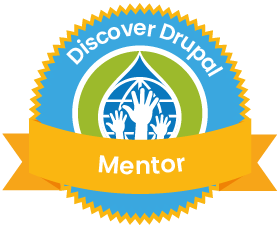
Become a mentor
Share your experience and expertise to help bring new talent to the Drupal community. Contribute to the Drupal project and a future of more engaging, relevant digital experiences informed by a broader range of perspectives.
Applications closed for 2022-2023.
Expectations and best practices for mentorship
- Gain a standard level of efficacy on Diversity, Equity, Inclusion, and Accessibility principles through professional development with program staff.
- Set up a consistently scheduled meeting time. For example, agree to talk via real-time chat or video call (Zoom, Google Hangouts, etc.) every Tuesday and Thursday at 10:00 EDT. This is the best way to ensure open lines of communication.
- Consistently engage in the Discover Drupal community support network, including in the private Discover Drupal Slack channel.
- Set some informal ground rules for communication.
- Focus on building a relationship with each other before beginning to determine goals and expectations. Things you share about your personal lives and personalities will build perspective and respect.
- Determine goals for the mentee. Examples for goals include fully understanding (with confidence) the concept of entities/bundles/fields, working the Drupal.org issue queue, or making a first-time Drupal community documentation contribution.
- Discuss expectations. Mentees should respect the designated times that mentors will be available. Mentors should understand that the first few weeks of learning can be challenging. Use the first few weeks to cement Drupal core concepts in the students' minds by suggesting complementary activities such as core documentation improvements or alternative exercises to gain confidence.
- Mentors should lead by example, asking mentees what their challenges are, what Drupal niches they are interested in, and look for ways to guide the mentee down meaningful paths.
- The mentor should consider themselves a guide to the Drupal community for the mentee. If the mentee hasn't been part of an open-source community before, they're likely to require guidance in navigation and communication. They should be encouraged to ask questions in the Drupal Slack workspace, update documentation on Drupal.org, attend local Drupal events, and learn to use the community as a networking tool.
- If the mentor is a code or documentation contributor to the Drupal community, they should encourage the mentee to participate in that activity to grow their experience.
- Mentors should always provide "best practices" advice and solutions to questions.
- Mentees should list their mentors on their Drupal.org profile (via the "Drupal" sub-tab on their Drupal.org user profile "edit" page).
- Mentors will receive a Discover Drupal mentor badge only if they complete an entire training cohort cycle and can commit a reasonable amount of time to their mentee, as indicated in the guidelines above.
- Should a mentor need to exit the program before completing a training cohort cycle, they should immediately notify a Drupal Association program lead and help identify and recruit a replacement mentor.
Thank you to Drupal Easy for allowing us to model this after their best practices for mentors.